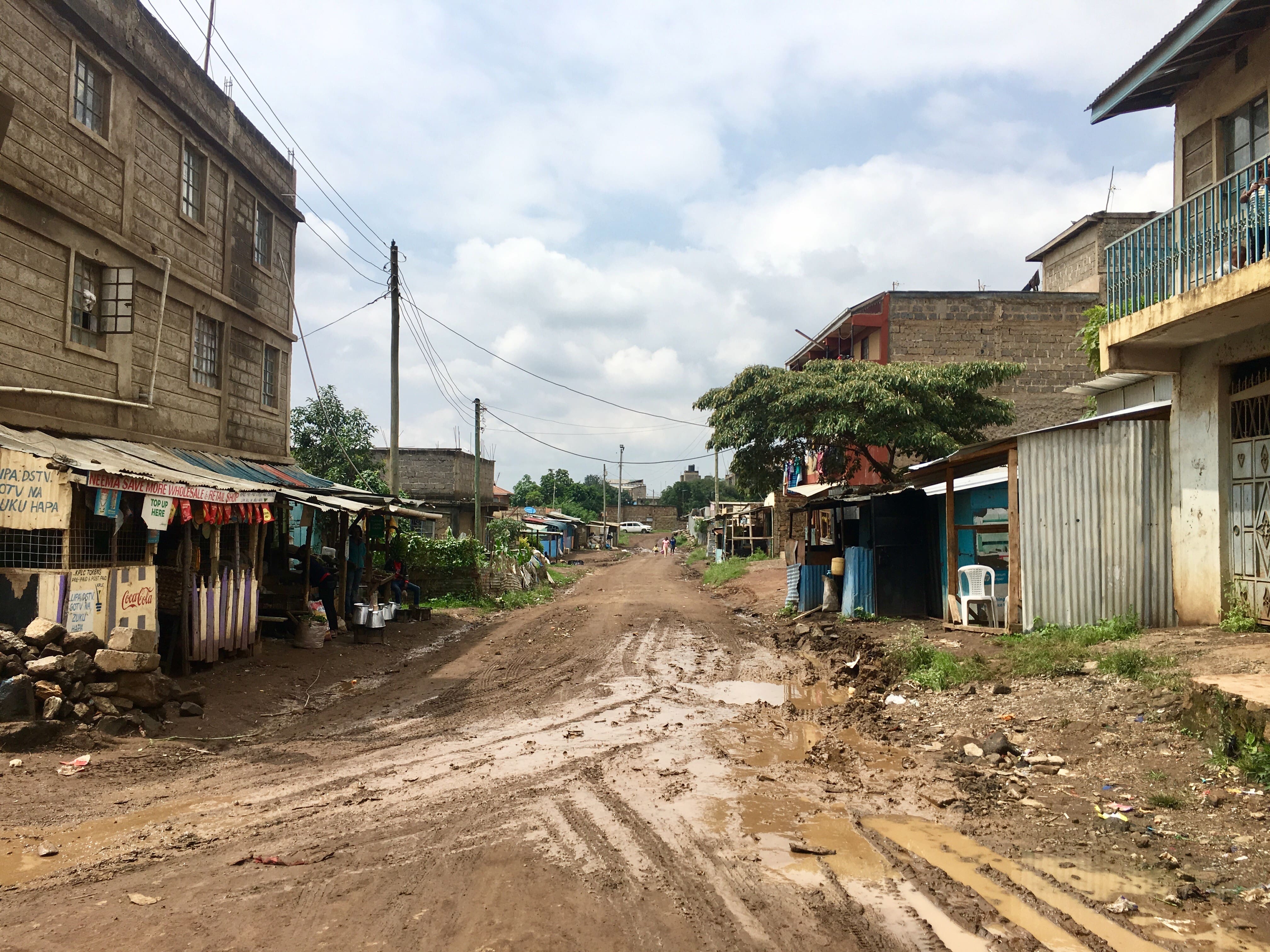Jul 15, 2019 | by Richard Reynolds, VisionFund International

The neighborhood that we visited during our field visit in Nairobi, Kenya.
I feel fortunate to have been a part of the kickoff meeting for SEEP’s Peer Learning Group on savings groups programming for refugees. As part of this exercise, we visited an urban Savings Group of Congolese refugees run by the Danish Refugee Council (DRC) in Nairobi. The DRC has launched 72 Savings Groups for about 800 refugees, and all of these are in their second or third savings cycle (each cycle is less than a year). I am pleased to share some of my thoughts and observations from this visit.
Urban Savings Groups face greater challenges than village-based groups. Sudden income shocks, difficulty in finding a location to meet and weaker community ties, all make it harder for urban-based groups to flourish. Refugees face similar challenges, but often of a greater magnitude and are often compounded by significant issues of harassment and protection (such as police stops and fears of deportation). This means that Savings Groups programs need more and not less time for implementation. However, very few programs are designed with this understanding. Too often, donor funding is short term (often only 1 year); yet the results are expected to be staggering. The DRC has been fortunate to get longer-term funding and this is why they have been successful in both forming and enabling groups to continue.
I was struck to see how challenging it was to communicate during our visit. The visitors (us) were a mix of English and French speakers, the DRC employees spoke Swahili and English and the Savings Group members Swahili, French and their local language. This resulted in multiple comical translations, but for me, the big observation was the need to have program staff speaking the local language. Money is a very personal issue, and to talk about it, we need everybody to feel comfortable. Having the staff speak the local language also allows facilitators to pick up sub-plots and undercurrents on transparency, group formation and group conduct to help ensure that misunderstandings, particularly over money matters, are quickly resolved. I, therefore, encourage organizations to hire more refugees who speak the local language. While there is a value attached to hiring host country staff to bridge gaps with local authorities, a balancing act could allow for more field-based staff in these key facilitating roles.
Having started out my professional life working with refugees in the 1980s and 90s, I was involved in financing many refugee businesses. It is surprising to see that the financial sector has not moved much forward since then. Within the NGO community, there is still great reluctance to truly believing that refugees can run businesses. The DRC explained that they had started working with 1,400 people in savings groups, but only 800 remain. We did not have time to dive into why this many dropped out, but one plausible observation suggests that the facilitators themselves did not believe in the refugees. One of the facilitators shared that it was only when the groups started saving that she became fully convinced that the project would work. I don’t blame her but rather recognize that when starting to work with refugees, we have a pre-conceived world view and mindset about them, which may not be true. Refugees are very diverse. Too often, our prejudices lead us to assume that they are short-term visitors, totally dependent and requesting assistance. By contrast, we met a lady who had fled to Kenya 4 years ago, runs a small business that she started up with her own funds, has signed a contract with a school to stitch their uniforms and has borrowed from the Savings Group to buy materials to fulfill the contract. Furthermore, she is not likely to return but remain in Nairobi. In other words, like many refugees, she is a typical microentrepreneur. This idea was further reinforced as we walked around the community, visiting many businesses largely run by Congolese refugees that look no different than other businesses in Nairobi. Certainly, refugees face challenges as non-Kenyans to operate their businesses, but it’s more a question of magnitude. Many others working in the microenterprise sector face similar challenges with negotiating a formal status for this business and domestic regulations whether they are Kenyan or non-Kenyan. The point is that refugees are like any others working in the informal sector: incredibly entrepreneurial and resourceful.
If the financial services sector were to shift its focus to finance people with an entrepreneurial spirit rather than their collateral and KYC (Know Your Customer) qualities, perhaps we would consider refugees as a more financeable group than others. As part of facilitating this process, we are working as a PLG team over the next few months to come up with key suggestions and actions in a simple one-page format that will enable programs to better link financial institutions to refugee Savings Groups.
Richard Reynolds is the Director for Products, Innovations and Partnerships at VisionFund International. The views expressed are those of the author and not necessarily those of the organization.
This field visit was part of the recently launched Peer Learning Group (PLG), Savings Groups: Expanding Access to Financial Services for Refugees, supported by SEEP’s Savings Groups Evidence and Learning Initiative - implemented in partnership with FSD Africa. The PLG will mobilize knowledge, empower its members through peer-to-peer support and improve the potential to replicate and scale successful approaches to expanding access to financial services for refugees and internally displaced people. Participating organizations: Trickle Up, the Danish Refugee Council, Mercy Corps, UNCDF, FSD Africa, VisionFund International, UN High Commissioner for Refugees and The SEEP Network.
Categories: Economic Strengthening and Recovery Fragile and Conflict-affected Environments Livelihoods Financial Inclusion Rural and Agricultural Finance Savings Groups English Savings Groups Blog Blog WebinarsBlogs

1621 North Kent Street, Ste 900,
Arlington, VA, 22209
P 202.534.1400
F 703.276.1433
Website Photos: © mari matsuri
